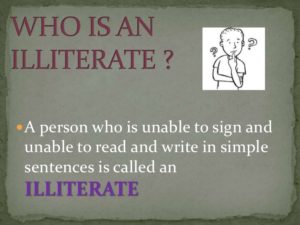
Illiteracy + Unemployment = Poverty
It’s estimated that over 90% of children out of school live in poverty.
As you can see, poverty is hunger. It’s about not having money, a job, or a shelter. It’s about being sick without treatment. This has people living one day at a time, but with little hope for the future.
According to the World Bank Organization, the primary cause of this is a lack of access to schools and the inability to read. Let’s explore this further.
Defining illiteracy
Illiteracy is defined as not knowing how to read or write beyond a basic level, understanding directions, or having the capacity to complete tasks in a timely manner.
A person can either be purely or functionally illiterate. Purely illiterate individuals cannot read or write in any capacity for all practical purposes. In contrast, functionally illiterate individuals can read and potentially write simple sentences with a limited vocabulary, but cannot read or write well enough to handle the daily requirements of life in their own society.
Here is a list of countries with the highest illiteracy rates:
The World's 20 Most Illiterate Countries
| Illiterate | Male | Female | |
|---|---|---|---|
| 1. Niger | 80.9 | 72.7 | 89.0 |
| 2. South Sudan | 73.2 | 65.2 | 80.8 |
| 3. Guinea | 69.6 | 61.9 | 77.2 |
| 4. Burkina Faso | 64.0 | 57.0 | 70.7 |
| 5. Central African Republic | 63.2 | 49.3 | 75.6 |
| 6. Afghanistan | 61.8 | 48.0 | 75.8 |
| 7. Benin | 61.6 | 50.1 | 72.7 |
| 8. Mali | 61.3 | 51.8 | 70.8 |
| 9. Chad | 59.8 | 51.5 | 68.1 |
| 10. Cote d’Ivoire | 56.9 | 46.9 | 67.5 |
| 11. Liberia | 52.4 | 37.6 | 67.2 |
| 12. Sierra Leone | 51.9 | 41.3 | 62.3 |
| 13. Ethiopia | 50.9 | 42.8 | 58.9 |
| 14. Mauritania | 47.9 | 37.4 | 58.4 |
| 15. Sudan | 46.5 | 40.2 | 53.3 |
| 16. Gambia | 44.5 | 36.1 | 52.4 |
| 17. Senegal | 44.3 | 31.5 | 56.2 |
| 18. Pakistan | 42.1 | 30.5 | 54.2 |
| 19. Mozambique | 41.2 | 26.7 | 54.6 |
| 20. Nigeria | 40.4 | 30.8 | 50.3 |
Resource: The World Factbook
I’m Somebody
Summary: We do not know if these countries’ illiteracy rates are purely or functional, but we do know that 18 of the world’s top 20 most illiterate countries are in Africa.
From this, we can conclude that some African nations lack the educational resources or tools needed to improve their lives.